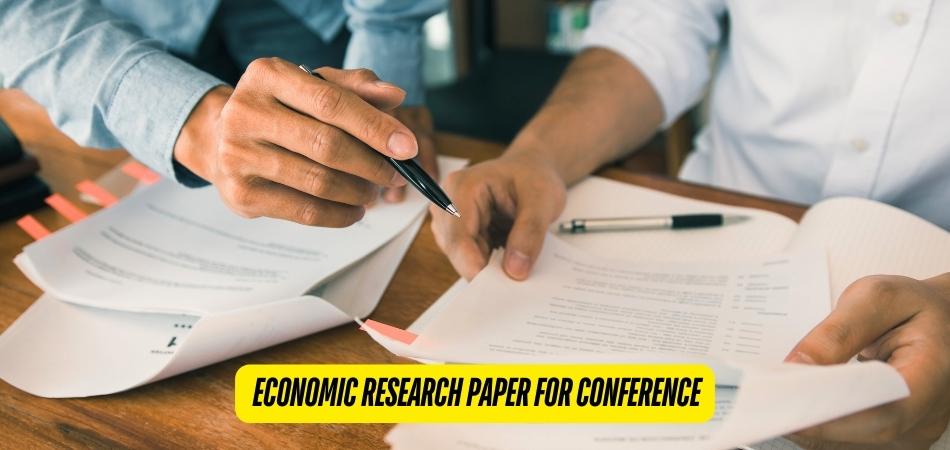Writing an impactful economic research paper for a conference is essential for presenting your work to a scholarly audience, gaining feedback, and building your academic reputation. If you’re wondering How to Write an Economic Research Paper for Conference? it begins with a clear research question that will guide your focus. A thorough literature review helps position your work within the field while selecting the right data and methodology strengthens your arguments.
Presenting findings logically, and concluding with the broader implications of your research, adds value to your study. Clarity, conciseness, and alignment with conference guidelines are critical for success. Dive into the rest of this article to discover detailed tips on perfecting each step of the process!
Writing an Economic Research Paper for Conference – Why Does It Matter?
Writing an economic research paper for a conference plays a vital role in academic development. It allows researchers to share their findings and insights with peers in the field. This exchange fosters collaboration and inspires new ideas, driving the discipline forward.
Presenting at events, such as the upcoming economics conference in Canada, provides a platform for valuable feedback. Engaging with fellow economists enhances your understanding of current trends and challenges. Such interactions can lead to future collaborations and broaden your professional network.
Moreover, these papers contribute to the global conversation on economic issues. They help shape policies and inform practices that can positively impact society. Ultimately, participating in conferences empowers researchers and enriches the academic community as a whole.
Who Presents Research Papers at a Conference?
Presenting research papers at conferences offers a unique opportunity for professionals to share insights, gain feedback, and build connections. Various individuals from different roles participate in these events, contributing to the academic and practical discussions. Here’s a look at who typically presents research papers at a conference.
University Professors and Researchers
University professors and researchers often present papers at conferences to share their recent findings. This helps them showcase work beyond the classroom or lab. They contribute knowledge, which is valuable for both academic and applied fields. Presenting also boosts their professional standing within the academic community.
Graduate and Doctoral Students
Graduate and doctoral students present their research to gain recognition and feedback. This experience builds their confidence and communication skills for future academic work. Presenting helps students network with experienced professionals in their field. It also allows them to receive feedback, improving their research quality.
Industry Professionals and Practitioners
Industry professionals present papers to bridge the gap between academia and real-world applications. Their presentations share practical insights based on actual business or industry experience. This allows academic researchers to understand industry challenges and refine their research. It also creates opportunities for collaboration between academia and industry.
Independent Scholars and Consultants
Independent scholars and consultants often present to gain visibility and build their reputation. They may work outside traditional institutions but offer valuable insights. Their work frequently introduces fresh perspectives, which enrich conference discussions. These presentations can lead to collaborations or consulting opportunities.
Government and Policy Experts
Government officials and policy experts present research to share data and trends with academic and industry audiences. Their presentations focus on how policies impact specific sectors or communities. This information helps researchers and industry experts understand the latest regulations and guidelines. Engaging with experts can help attendees align their work with current policies.
Is it Mandatory to Present an Economic Research Paper at a Conference?
No, presenting an economic research paper at a conference is not mandatory. While presenting can enhance academic exposure, attendees can still gain valuable insights. Many attend economics conferences to network, learn, and stay updated without submitting their own paper.
Attending the conference allows individuals to stay up to date on recent industry developments and research, even if they do not present any research paper. Besides, attending economics conferences without paper submission enables them to connect with other economists and explore potential collaborations.
Observing other presentations offers a chance to learn presentation techniques and research approaches. It’s an excellent opportunity for students and professionals to improve their skills. Attending without presenting still brings significant value to one’s academic journey and professional growth.
How to Write an Economic Research Paper for a Conference?
Writing an economic research paper for a conference requires careful planning and a clear structure. This step-by-step guide will walk you through each essential stage of the process. Following these steps will help you create a paper that stands out.
Step 1: Define Your Research Question
Crafting a focused research question is the foundation of your paper. It directs your study, ensuring clarity in your objectives. Make sure the question is specific, relevant, and contributes to existing knowledge. A well-defined question makes it easier to organize your analysis.
Step 2: Conduct a Thorough Literature Review
Reviewing existing literature helps position your work within the field. Identify gaps in research and relevant theories that support your study. This step provides context and shows how your paper builds on previous work. Cite key sources to establish credibility and avoid redundancy.
Step 3: Select Appropriate Data and Methodology
Choose data and methods that best address your research question. Data should be reliable and fit the scope of your study. Explain your methodological approach clearly, showing how it supports your analysis. This ensures that others can understand and potentially replicate your work.
Step 4: Analyze and Interpret Your Findings
Present your findings logically, using charts or tables if needed for clarity. Interpret the results, explaining their significance in the context of your research question. Avoid complex jargon to keep your interpretation accessible. Well-structured analysis makes your argument stronger and more convincing.
Step 5: Draw Conclusions and Discuss Implications
Summarize your main findings and their broader implications. Highlight how your research contributes to the field of economics. Discuss any limitations and suggest directions for future studies. This adds depth to your work and encourages further exploration.
Step 6: Edit and Follow Conference Guidelines
Proofread your paper thoroughly to eliminate errors and improve flow. Ensure clarity, conciseness, and adherence to conference formatting requirements. Double-check citation style and paper length as per guidelines. Careful editing reflects professionalism and strengthens your overall presentation.
Essential Tips to Present Research Paper at a Conference
Presenting a research paper at a conference is an invaluable opportunity to share insights and receive feedback from peers. It requires careful preparation to ensure your message is clear and impactful. Here are essential tips to help you succeed in your presentation.
- Understand Your Audience: Tailor your presentation to match the knowledge level of the audience. Focusing on relevant details keeps the presentation engaging and accessible.
- Craft a Clear Structure: Organize your talk with a logical flow, including an introduction, main points, and conclusion. This approach guides listeners through your research effortlessly.
- Use Visual Aids: Effectively Visual aids like slides should enhance, not overwhelm, your presentation. Limit text on slides and use charts to illustrate data.
- Practice Concise Delivery: Rehearse to keep within the allotted time while covering all key points. Practicing also boosts confidence and helps reduce presentation anxiety.
- Engage with the Audience: Encourage questions and make eye contact to build a connection. Engaging makes the session interactive and leaves a lasting impression.
- Focus on Key Findings: Highlight the main takeaways and implications of your research. Emphasizing key findings helps the audience grasp your work’s significance quickly.
- Prepare for Questions: Anticipate potential questions and rehearse concise responses. Being prepared shows professionalism and encourages productive discussions after your presentation.
- Follow Conference Guidelines: Adhere to international conference protocols and presentation rules, especially time limits. For example, specific guidelines on presenting research at Canadian Economics Conference can be found in the guides on steps to present research at Canadian economics conference.
FAQs About How to Write an Economic Research Paper for Conference?
In this FAQ section, we address common questions about writing economic research papers for conferences. Whether you’re a first-time presenter or looking to refine your approach, these answers provide helpful insights and practical tips for managing the process effectively:
How to Choose the Right Conference for Your Research?
Selecting the appropriate conference is crucial for reaching your target audience. Consider the conference’s focus, reputation, and the attendees’ expertise. Ensure your research aligns with the conference themes to maximize relevance and impact. Research past conferences to gauge the quality and networking opportunities available.
How to Develop a Strong Introduction?
Begin with a clear statement of your research problem and its importance. Provide background information to contextualize your study within the broader field. Outline your research objectives and the approach you will take. A strong introduction engages readers and sets up the framework for your paper.
What Are the Best Practices for Writing Clearly?
Use simple and direct language to convey your ideas effectively. Avoid jargon unless necessary, and define technical terms for clarity. Structure your paper with clear headings and logical flow to guide the reader. Proofread thoroughly to eliminate errors and enhance readability.
What Tools Can Aid in Writing and Presenting?
Utilize software like Microsoft Word or LaTeX for writing, ensuring proper formatting and citation management. Presentation tools such as PowerPoint or Prezi can help create visually appealing slides. Reference management tools like EndNote or Zotero streamline the citation process. These tools enhance efficiency and the overall quality of your work.
How to Ensure Ethical Research Practices?
Adhere to ethical guidelines by obtaining necessary approvals and consents for your research. Ensure data integrity by accurately reporting findings and avoiding fabrication or manipulation. Properly cite all sources to respect intellectual property and avoid plagiarism. Ethical practices build trust and credibility in your research.
Bottom Line
The process of writing an effective economic research paper for a conference involves a number of crucial steps. Identify a clear research question that guides your focus, then conduct a literature review to position your work within the field. As you think about how to write an economics research paper for conference? , selecting appropriate data and methodology is necessary for strengthening your arguments. Analyzing and interpreting findings clearly, while discussing their broader implications, adds significant value to your research.
Besides that, precise editing and adherence to conference guidelines ensure professionalism. By following these steps, you increase your chances of making a meaningful impact in the academic community and beyond.








